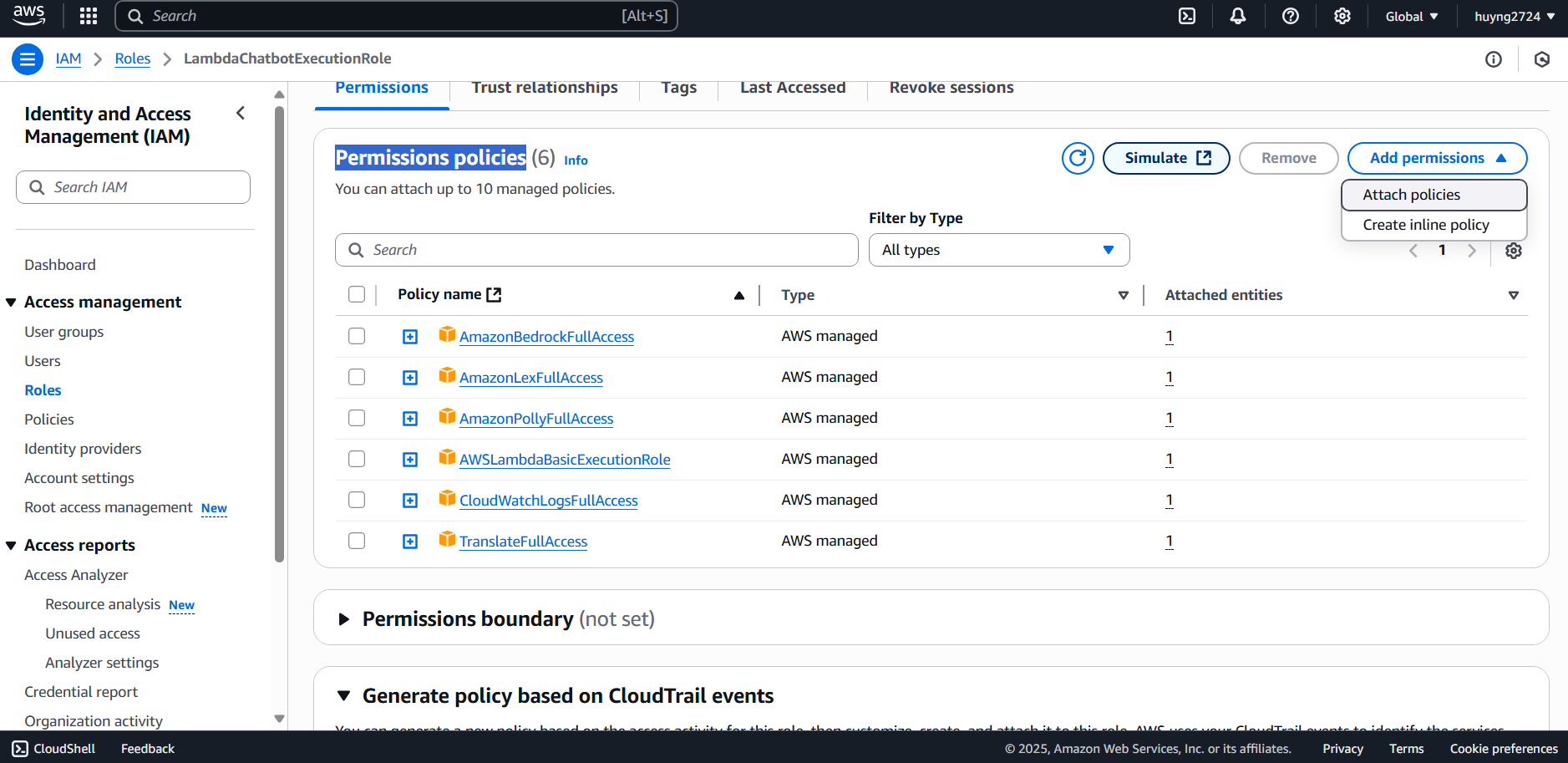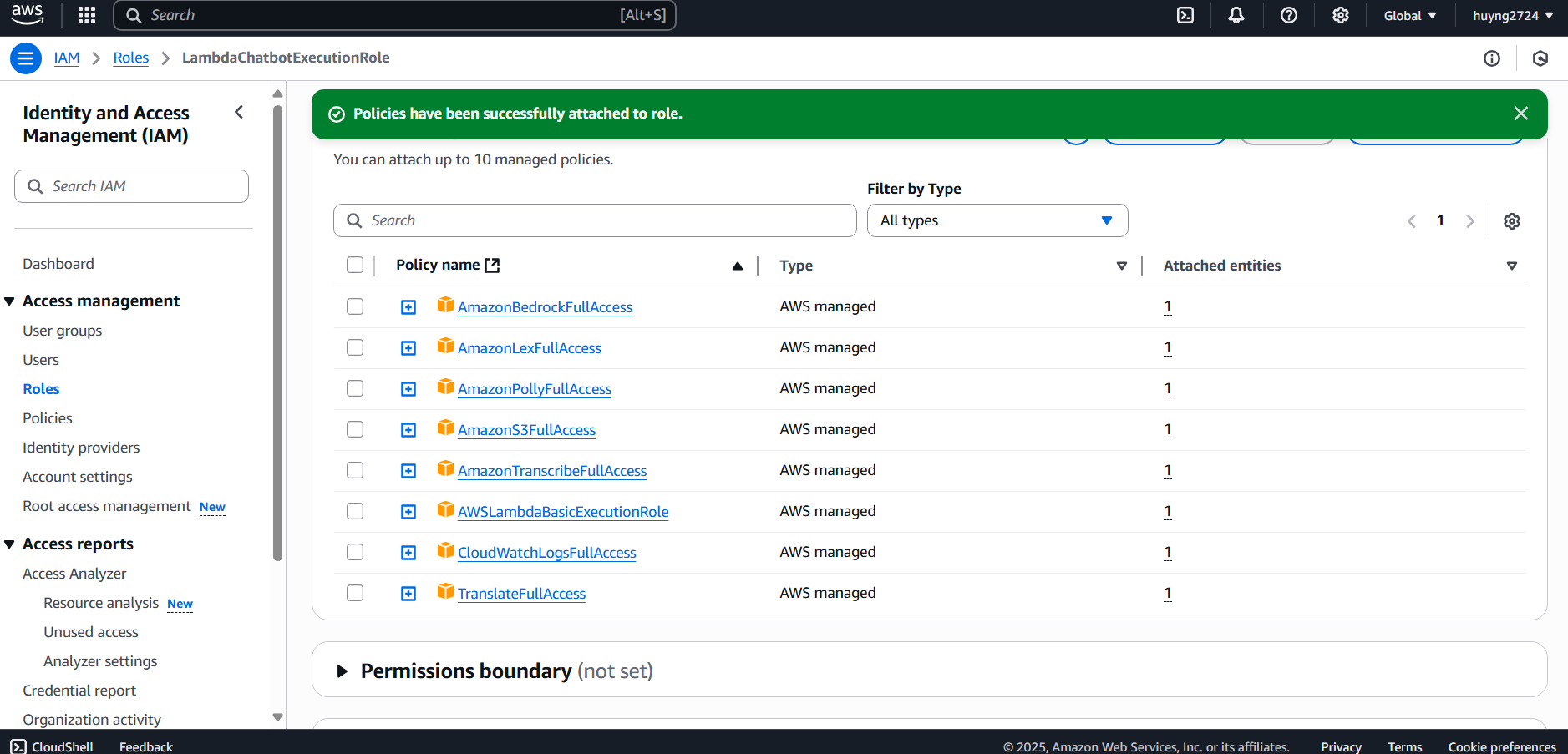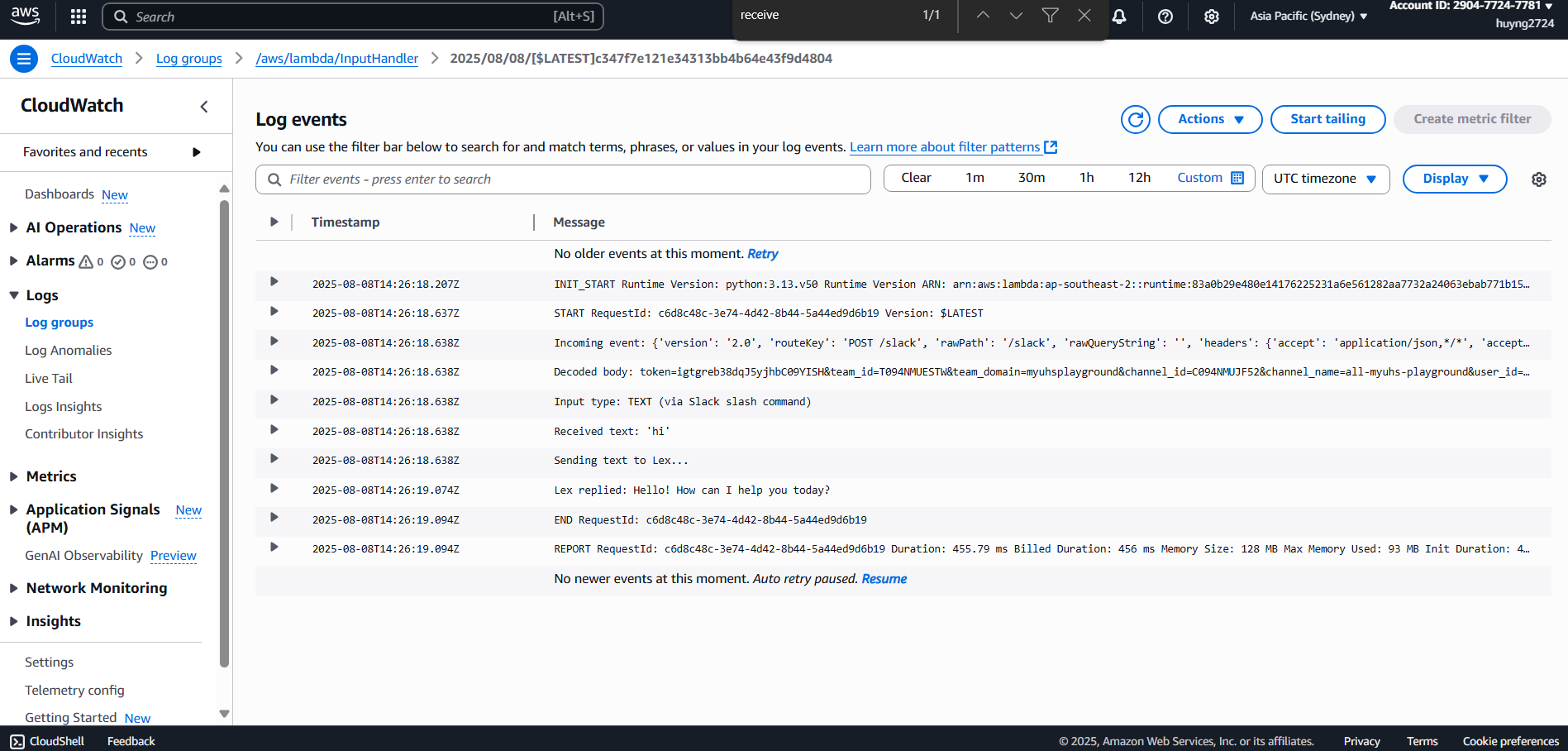3. Processing Incoming Data
In this section, we will extend the InputHandler Lambda function to:
- Detect whether the input from Slack is text or audio
- If it is text → Automatically detect the language and translate it to English (note: you need a paid plan to use this feature)
Step 1: Update IAM Role for Lambda (optional if you want to send audio)
To access S3, you need to update the IAM role you created earlier.
- Go back to the LambdaChatbotExecutionRole role, in the Permissions policies tab, click Attach Policies.

- Search for and check the
AmazonS3FullAccesspolicy. - Search for and check the
AmazonTranscribeFullAccesspolicy to use Transcribe. Since this workshop does not focus strictly on role management or permissions, we will use full access for convenience. - Click Add Permissions to complete.

Step 2: Prepare S3 bucket (optional if you want to send audio)
- Go to the S3 console: https://s3.console.aws.amazon.com/s3
- Click Create bucket
- Enter the following information:
- Bucket name:
aws-chatbot-audio - Region: Same region as your other services.
- Leave other options as default.
- Bucket name:
- Click Create bucket to finish.
Step 3: Update the InputHandler Lambda function
Go to the Lambda console, open the InputHandler function, and update the code as below. Replace BOT_ID and BOT_ALIAS_ID with your actual values:
import json
import boto3
import urllib.request
import uuid
import time
import base64
from urllib.parse import parse_qs
s3 = boto3.client('s3')
translate = boto3.client('translate')
transcribe = boto3.client('transcribe')
lex = boto3.client('lexv2-runtime')
BUCKET_NAME = 'aws-chatbot-audio'
BOT_ID = '<YourLexBotId>' # replace with your actual Bot ID
BOT_ALIAS_ID = '<YourAliasBotId>' # replace with your actual Bot Alias ID
LOCALE_ID = 'en_US'
def is_audio(event):
files = event.get('files', [])
return any(f.get('mimetype', '').startswith('audio/') for f in files)
def download_audio_file(url, headers):
req = urllib.request.Request(url, headers=headers)
return urllib.request.urlopen(req).read()
def upload_to_s3(data, key):
s3.put_object(Bucket=BUCKET_NAME, Key=key, Body=data)
return f's3://{BUCKET_NAME}/{key}'
def start_transcribe(s3_uri):
job = f"job-{uuid.uuid4()}"
transcribe.start_transcription_job(
TranscriptionJobName=job,
Media={'MediaFileUri': s3_uri},
MediaFormat='mp3',
LanguageCode='en-US',
OutputBucketName=BUCKET_NAME
)
return job
def poll_transcribe(job, timeout=30):
elapsed = 0
while elapsed < timeout:
res = transcribe.get_transcription_job(TranscriptionJobName=job)
status = res['TranscriptionJob']['TranscriptionJobStatus']
if status == 'COMPLETED':
return res['TranscriptionJob']['Transcript']['TranscriptFileUri']
elif status == 'FAILED':
raise Exception("Transcribe job failed")
time.sleep(3)
elapsed += 3
raise TimeoutError("Transcribe job timed out")
def fetch_text(uri):
with urllib.request.urlopen(uri) as r:
return json.loads(r.read())['results']['transcripts'][0]['transcript']
def send_to_lex(text, session_id):
res = lex.recognize_text(
botId=BOT_ID,
botAliasId=BOT_ALIAS_ID,
localeId=LOCALE_ID,
sessionId=session_id,
text=text
)
return res['messages'][0]['content'] if res.get('messages') else "No reply from Lex."
def lambda_handler(event, context):
print("Incoming event:", event)
# Handle Slack URL verification challenge
if 'body' in event:
body_str = event['body']
if event.get('isBase64Encoded', False):
body_str = base64.b64decode(body_str).decode('utf-8')
try:
# Try to parse as JSON first (for Slack events)
body_json = json.loads(body_str)
if body_json.get('type') == 'url_verification':
print("Handling Slack URL verification challenge")
return {
'statusCode': 200,
'body': body_json.get('challenge', ''),
'headers': {'Content-Type': 'text/plain'}
}
except json.JSONDecodeError:
# If not JSON, continue with existing logic (form data)
pass
text = ""
if 'body' in event and 'headers' in event:
body_str = event['body']
if event.get('isBase64Encoded', False):
body_str = base64.b64decode(body_str).decode('utf-8')
print(f"Decoded body: {body_str}")
# Try to parse as form data (for slash commands)
try:
body = parse_qs(body_str)
text = body.get('text', [''])[0].strip()
print("Input type: TEXT (via Slack slash command)")
print(f"Received text: '{text}'")
except:
print("Could not parse as form data")
if not text or not text.strip():
return {
'statusCode': 200,
'body': json.dumps({
'text': 'Please provide some text.',
'response_type': 'ephemeral'
}),
'headers': {'Content-Type': 'application/json'}
}
# Translate text to English if needed
original_language = 'en'
english_text = text # Default initialization
try:
translate_result = translate.translate_text(
Text=text,
SourceLanguageCode='auto',
TargetLanguageCode='en'
)
original_language = translate_result['SourceLanguageCode']
english_text = translate_result['TranslatedText']
print(f"Detected language: {original_language}")
print(f"Translated to English: '{english_text}'")
except Exception as e:
print(f"Translation error: {e}")
original_language = 'en'
english_text = text # Fallback to original text
print("Sending text to Lex...")
lex_msg = send_to_lex(english_text, session_id="test-session-123")
print(f"Lex replied: {lex_msg}")
return {
'statusCode': 200,
'body': json.dumps({
'text': lex_msg,
'response_type': 'in_channel'
}),
'headers': {'Content-Type': 'application/json'}
}
Step 4: Deploy & Test
- Test and Deploy the Lambda with the code above.
You should increase the Lambda timeout to 15 seconds to avoid errors.
- Test with Slack:
- Send text: the bot will translate → Lex → respond
- Send audio: the bot will transcribe → Lex → respond (currently not supported)

After deploying and testing the function:
- Go to AWS Console → Lambda → select your function
- In the sidebar, click Monitor → View logs in CloudWatch
- Search by execution time → open the latest log stream to see details
